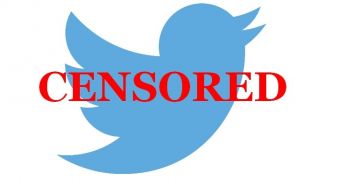Earlier today, reports indicated that the Twitter accounts of several extremists in Russia were blocked, but the company is denying the reports.
According to Bloomberg, the company said that it would not unilaterally block accounts belonging to extremists, from Russia or not, but it will remove tweets that are deemed inappropriate.
In fact, Twitter’s Public Policy Chief, Colin Crowell, has met with Alexander Zharov, the head of the Russian communications regulator as the country seeks to block content that it considers extremist, such as that coming from Ukrainian national groups. Zharov has stepped out and has told the media that Twitter has agreed to restrict access to about 10 accounts.
Twitter, on the other hand, is rebuking the claims, saying that it agreed to no such thing. Admittedly, access in Russia to the account of the Pravyi Sektor group from Ukraine was blocked a month ago, but no political accounts were removed.
Zharov’s office continued the back and forth and clarified that it had passed Twitter information about 12 blogs it wanted blocked, not that Twitter had actually blocked them.
The accounts that the scandal revolves around belong to a nationalist group in Ukraine whose members criticize Russia for annexing Crimea.
In recent months, there has been an increasing number of censoring requests received by Twitter. The fact is that the company has gone public last year and any news about possibly being blocked in a country or another, which is the alternative to not complying with the requests of the governments, has a big impact on the company’s standing on the stock exchange.
Basically, Twitter can’t really afford to be the rebel it used to be even though it may want to simply deny government officials in Russia, Turkey, and many other countries that want to block out whatever content it suits them.
Most often than not, the accounts that Twitter is asked to block contain information that governments don’t want citizens to see, such as corruption proof, as it happened in Turkey, or extremist messages, as it’s happening now in Russia and Ukraine.
This is plain censorship and an attack to the freedom of expression and Twitter knows that just as well as the next person, but it’s quite likely that it has very little choice. After all, this is a matter of blocking access to a few accounts in a certain territory or denying access to its service to millions of people if the government decides to order ISPs to block Twitter, as it happened in Turkey.

 14 DAY TRIAL //
14 DAY TRIAL //